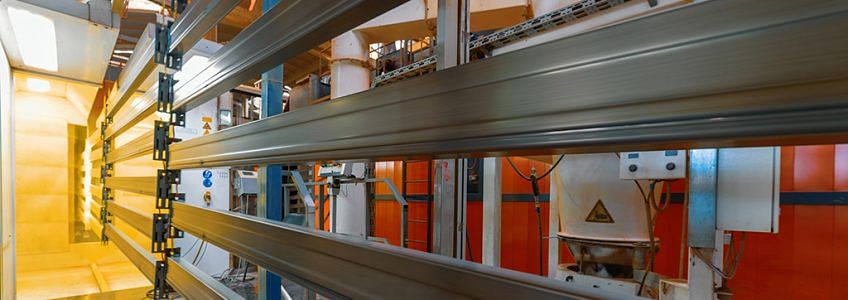How to Avoid Rust and Corrosion with Powder Coating

The topic of rust and corrosion is not the average everyday dinner conversation. Well, not unless it comes up during a friendly round of Jeopardy. For those searching for durability and long-lasting paint finishes, it’s no secret that powder coating is one of the strongest coatings out there. It can handle a lot of abuse before it will chip, fail, or even scratch. For this reason, it’s a top choice for most industrial applications and automotive parts. Still, one of the most searched topics about powder coating is its resistance to rust and corrosion.
What is Rust and Why Does it Matter?
For most of us, the thought of rust isn’t a big concern until it is a concern. Think of it in terms of buying a preowned vehicle, tractor, or large piece of equipment. If we see signs of rust, we most likely are going to avoid it and check out other options. The same is true for heavy machinery and industrial equipment. This is where powder coating finishes can show off their superior strength and protection from rust and corrosion, therefore saving businesses thousands of dollars on their operational budgets.
As we take a closer look at the effects of rust on metals, let’s take a quick lesson on what rust is. Rust is a form of iron oxide that occurs when iron combines with oxygen in the air, causing corrosion. It’s highly recognizable with its orange-brown crusty buildup on metal pieces.
The effects of rust can occur on iron, the alloys of iron, and steel. It occurs when metals become exposed to water and oxygen – with water being the main contributing factor. Even though iron and steel equipment and structures appear solid to the human eye, water molecules can wedge their way into tiny, unseen holes and gaps in the metal. So as the water begins to settle, the corrosion process begins.
Rust Is a Type of Corrosion
We aren’t going to get into a giant lesson on corrosion versus rust, but it is important to understand that rust is a type of corrosion. Corrosion is the result when metals, and even non-metals, start to deteriorate because of the oxidation, leading to rust. Therefore, rust is the oxidation of iron when exposed to moisture and the presence of air.
In today’s rust and corrosion lesson, we will spare you from the overwhelming science and nitty-gritty details of what happens. We do want to expose the effects of powder coating and how it benefits and extends the life of industrial equipment and machinery.
Powder Coating Slows Down Rust and Corrosion
There is absolutely no technique that can guarantee metal pieces will never encounter problems with rust and corrosion. But the superior durability of powder coating offers long-term rust-resistant finishes designed to prevent metal oxidation by keeping the equipment protected from exposure to oxygen and water.
Applied as a dry powder, powder coating techniques have almost immediate drying and curing times, creating stronger and more durable finishes than wet/liquid paint applications. Powder coatings are typcially applied to manufacturing equipment, industrial machinery, automotive parts and outdoor metal equipment, furniture, and fencing to create strong paint bonds designed for lasting performance.
Powder Coating Over Existing Rust on Industrial Equipment
Manufacturers and industrial companies seeing visible signs of rust on their equipment often take a proactive approach and seek out powder coating. Some companies will elect to paint or powder coat over the existing rust. This is not a recommended option.
When rust is not removed before powder coating, rust continues to grow and worsen over time, contributing to increased deterioration of the equipment and limits to its functionality.
Where rust is already evident, it’s imperative that the equipment undergo a complete rust removal process, such as sandblasting. Professional sandblasting can quickly and effectively remove rust and restore metal surfaces to their preoxidized state. Only at this point is it safe to move into powder coating techniques to preserve and restore the machinery and equipment.
While powder coating won’t fully stop the oxidation process, it can slow the process down by sealing up the metal from additional air and moisture. When exposed to outdoor weather and extreme elements, powder coating not only puts a halt to corrosion and rust, it creates a flexible, durable finish that is highly resistant to scratching and flaking.
When considering powder coatings to extend the life of your industrial equipment, keep in mind powder coating is more cost-efficient than traditional paints. Powder coating is free of toxic chemicals and solvents and regarded as safe for usage and disposal. And because the powder essentially melts and reforms as a solid around metal pieces, it creates a smooth surface without drips and messy runs, eliminating the need to resand or refinish. Powder coating can a mistake-free process with a maintenance-free result.
Choosing the right powder coating company for your industrial or manufacturing equipment project is an important factor in its long-term success. With the largest oven in the upper midwest, the professionals at Powder Coating Technologies take pride in contributing to the success of every product. With a 7000 lbs capacity oven to hold equipment up to 40-feet, Powder Coating Technologies specializes in short production runs and the ability to work with large and heavy objects with quick turnarounds. To discover more about the commercial/industrial finishing capabilities of Powder Coating Technologies, reach out to the experts today.